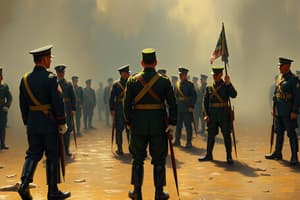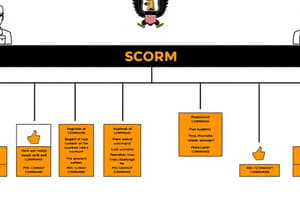Podcast
Questions and Answers
What is the FIRST ELEMENT of a fire command?
What is the FIRST ELEMENT of a fire command?
- ALERT (correct)
- DESCRIPTION
- WEAPON OR AMMUNITION
- DIRECTION OR ELEVATION
What identifies which weapon or ammunition type is to be fired during the engagement?
What identifies which weapon or ammunition type is to be fired during the engagement?
WEAPON OR AMMUNITION
What is the description of the threat or threats that a small unit or crew engages?
What is the description of the threat or threats that a small unit or crew engages?
DESCRIPTION (TARGET DESCRIPTION)
What is given as a guide to the firer in various ways?
What is given as a guide to the firer in various ways?
What tells the firer to set the weapon sight in order to engage properly?
What tells the firer to set the weapon sight in order to engage properly?
What describes the way the targets are engaged?
What describes the way the targets are engaged?
What element provides the leader the ability to manage ammunition and friendly exposure?
What element provides the leader the ability to manage ammunition and friendly exposure?
Who is authorized to announce the execution command during a fire command?
Who is authorized to announce the execution command during a fire command?
What informs soldiers to stop firing all weapons and systems?
What informs soldiers to stop firing all weapons and systems?
What determines short range machine gun for 7.62 mm and .50 CAL?
What determines short range machine gun for 7.62 mm and .50 CAL?
What determines long range machine gun for 7.62 mm and .50 CAL?
What determines long range machine gun for 7.62 mm and .50 CAL?
What determines long range machine gun for MK 19?
What determines long range machine gun for MK 19?
What determines short range machine gun for MK 19?
What determines short range machine gun for MK 19?
What are the 5 sensing terms?
What are the 5 sensing terms?
What are the 3 common location methods?
What are the 3 common location methods?
What is the maneuver box constant?
What is the maneuver box constant?
What are 5 response terms?
What are 5 response terms?
What is immediate range determination?
What is immediate range determination?
What is deliberate range determination?
What is deliberate range determination?
Flashcards are hidden until you start studying
Study Notes
Elements of a Fire Command
- ALERT: Initiates all fire commands; notifies of engagement and identifies the firers.
- WEAPON OR AMMUNITION: Specifies the weapon or ammunition type to be used; can be omitted based on circumstances.
- DESCRIPTION (TARGET DESCRIPTION): Details the threats being engaged; essential for all fire commands, identifies specific targets.
- DIRECTION OR ELEVATION: Guides the firer in targeting; helps leaders describe target locations, particularly in urban or restricted environments.
- RANGE: Instructs the firer on weapon sight settings; announced in hundreds or thousands of meters.
- METHOD: Describes engagement tactics; assists in determining target priority; can specify collective fire patterns.
- CONTROLS: Enables leaders to manage ammunition usage, safety, and engagement rules; sets conditions before engagement.
- EXECUTION: Authorizes the commencement of engagement; only the unit leader has the authority to announce this command.
- TERMINATION: Commands soldiers to cease firing; essential for safety and can be issued by any member for various reasons.
Machine Gun Ranges
- Short Range (7.62 mm and .50 CAL): Defined as engagements at less than 400 meters.
- Long Range (7.62 mm and .50 CAL): Defined for engagements at more than 600 meters.
- Long Range (MK 19): Defined for engagements that are more than 600 meters but less than 1000 meters.
- Short Range (MK 19): Defined as engagements between more than 65 meters but less than 400 meters.
Sensing and Response Terms
- 5 Sensing Terms: Doubtful, Lost, Over, Short, Target.
- 3 Common Location Methods: Clock, Grid, Orientation.
- 5 Response Terms: Identified (Range), On the Way, (Crewmember) Complete, Cannot Identify, Cannot Engage.
Range Determination Methods
- Immediate Range Determination: Utilizes Laser Range Finder (LRF), range recognition, and a unit of measure of 100 meters.
- Deliberate Range Determination: Employs mil relationship, engagement with adjacent elements, map references, flash-to-bang measurements, and known range calculations.
Maneuver Box Constant
- Value: 0.4471416 - used in calculations related to maneuvering in combat operations.
Studying That Suits You
Use AI to generate personalized quizzes and flashcards to suit your learning preferences.



